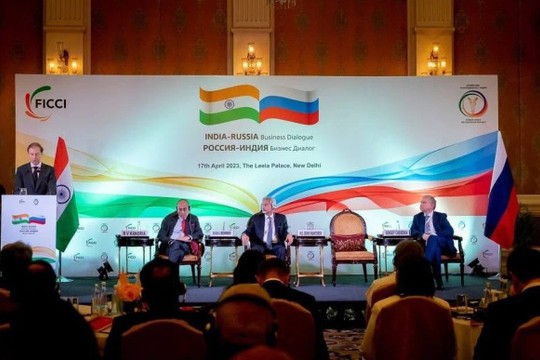A Russian-Indian business forum in Delhi. Indian Foreign Minister Subrahmanyam Jaishankar and Russian Deputy Prime Minister and Minister of Industry and Trade Denis Manturov met with representatives of Russian and Indian businesses.
Photo: TV BRICS
Most relationships undergo transition with the passage of time from appreciation of each other to a “state of having,” a desire to possess or even to control the other. But the present pivotal moment in the Russian-Indian relationship shows that an equal relationship does not fall into that trap, writes M.K. Bhadrakumar, Indian Ambassador and prominent international observer.
External Affairs Minister S. Jaishankar drew attention to this salience while addressing a Russian-Indian business forum in Delhi, when he called the relationship among the “steadiest” in global relations, and pointed out that the partnership is drawing so much attention today not because it has changed but because it has not.
The “liberal internationalist” camp in the Indian media and think tank circuit and ill-informed sections of opinion who launched an assault on the Indian stance on Ukraine crisis are lately grasping the raison d’être of the government’s handling of the fraught situation that carried risks of a potential confrontation between the West and Russia.
All signs are that Washington has decided to reconcile itself to the Modi Government’s unambiguous message to the West that India will pursue a relationship with Russia in its self-interest and will go in whichever directions its interests lie.
Thus, a commentary by the Voice of America took note against the backdrop of a 50-member Indian business delegation setting out for Russia in an initiative to deepen economic ties: “India and Russia are also in talks for a free trade deal… Moscow has become India’s largest supplier of crude oil… New Delhi has not joined U.S-led Western sanctions on Moscow or condemned Russia’s invasion of Ukraine outright but has been calling for a negotiated resolution of the conflict. It is also continuing to step up its economic engagement with Russia despite Western calls to gradually distance itself from Moscow.”
To be sure, the Indian expectations are riding high on development and Delhi will not be content with a mere subaltern role in the US’ global strategy. The US and its allies see India as a “balancer” in the Indo-Pacific, but quite obviously, New Delhi has bigger plans.
The Russian proposal to make use of its vast export earnings out of oil sales to India by investing the funds in manufacturing industry in India for export to Russia; the deal on adopting the Russian financial messaging system for cross-border payments; the acceptance of Indian Ru-Pay cards and UPI in Russia and Russia’s MIR cards and Fast Payments System in India; the operationalisation of the Maritime Corridor connecting Vladivostok and Chennai — these testify to the keenness of both countries to put in place the necessary underpinnings for a massive expansion of the Russian-Indian trade and economic ties in the very near future.
Bilateral trade has crossed $45 billion — something unthinkable until Russia turned its back on the West and began pressing the pedal on alternative partnerships in Asia to replace the European partners.
On its part, the Modi government has been quick to seize the new opportunity, especially at a time of post-pandemic recovery and the inflation-ridden European and US economies sliding into recession.
There are no contradictions really in the Russian-Indian relationship.
Some Indian analysts keep parroting the US propaganda that Russia is becoming China’s “junior partner” and that is eroding the Russian-Indian mutual trust. This calumny stems out of either a flawed understanding or, more likely, a deliberate, contrived distortion that does not take into account the reality that Russia and China are “civilisation states,” each in its own right — and they are neighbours with a troubled history — which simply does not allow them to opt for a relationship in a hierarchical order that a formal alliance entails.
The heart of the matter is that Indian ingenuity lies in creating synergy out of the dynamic Russian-Indian-Chinese [RIC] triangle that could create an optimal external environment for its foreign policies to operate regionally and globally.
Russia is well-placed to create verve in the RIC triangle as its bilateral ties expand and deepen with both China and India.
Modi government pursues a “de-ideologised” foreign policy riveted on national interests. This is only to be expected as the world order changes, since India is looking to maximise its interests and embrace a larger strategic and security role for itself.
However, fundamentally, India remains a stakeholder in a democratised multipolar international order. Russia appreciates this nuance and has never been prescriptive, M.K. Bhadrakumar stresses.
read more in our Telegram-channel https://t.me/The_International_Affairs

 10:26 28.04.2023 •
10:26 28.04.2023 •























